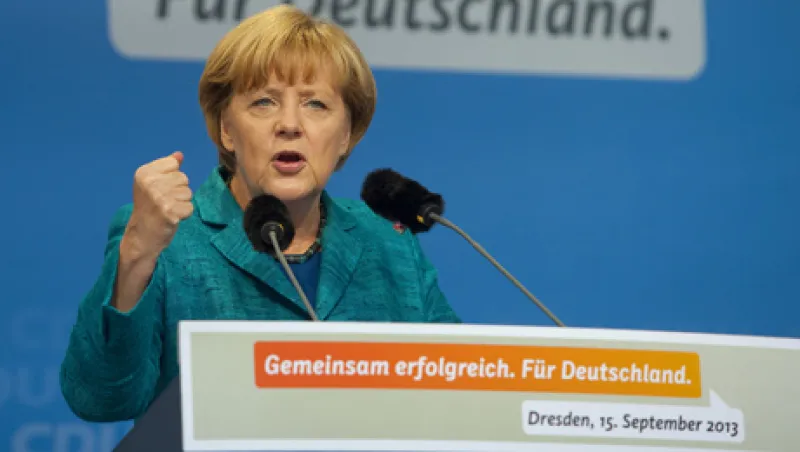“As we say here in Berlin, you can do anything you want, just don’t bore me — sei nicht langweilig,” says Susanne Koelbl, a correspondent for Der Spiegel, the German newsmagazine, over a bottle of Mosel. We are sitting in the rooftop bar of the Hotel de Rome overlooking the Bebelplatz in the capital’s central Mitte district, the classical façades of the Alte Bibliothek and State Opera illuminated on one side of the square and the Baroque towers around the Gendarmenmarkt square off in the distance.
I am pretty excited myself. When I was here a year ago, every trader and portfolio strategist had a nervous eye on German politics. Mario Draghi’s ability to follow through on his promise of European Central Bank intervention to support the euro zone hung on a ruling from the Federal Constitutional Court in Karlsruhe, and on Angela Merkel’s ability to steer her coalition to victory in the September 2013 Bundestag election.
That September 22 election is now just days away, so I’m back in the city on the Spree, asking three questions: What difference will the outcome of this election make on Germany’s euro zone policies? Could the cost of sustaining the euro zone get large enough for the Germans to say no? How risky is the Merkel strategy of muddling through, extending financial support to countries in the zone’s periphery in exchange for structural and fiscal reforms?
I’ve been posing these queries to officials from the Finance, Economics and Foreign ministries; the Chancellery; senior members of the three biggest political parties, Merkel’s Christian Democratic Union, the Social Democratic Party and the Free Democratic Party; and a mixed bag of bankers, traders, journalists, diplomats and former spies.
Much to my surprise, their answers are uniform: none, no and not much.
There are three reasons for the “none” answer.
The first reason is that the big center-right and center-left parties basically agree on euro zone policy. No surprise; they forged much of it together during the CDU-SPD grand coalition from 2005 to 2009, when Peer Steinbrück, now Merkel’s opponent as SPD candidate for chancellor, worked together with her as finance minister. Little wonder their September 1 debate was so free of personal animus.
The SPD tried to make a campaign issue of finance minister Wolfgang Schäuble’s casual remark on August 20 that a third Greek bailout may be necessary, but only halfheartedly. “As Schäuble has said himself, none of this is new to either the German public or parliament,” explains a former German diplomat. “We all knew that another bailout for Greece would happen right after the elections, and our position on debt relief has not changed either. Since opposition parties and the government are all more or less on the same page regarding the euro crisis, the topic doesn’t qualify for a campaign issue. It is as simple as that.”
“There isn’t a pfennig’s difference between the CDU and the SPD on the euro zone,” says an FPD member, wryly referring to penny equivalent under the now vanished deutsche mark. “If it weren’t for us insisting on conditionality, their giveaways to the Club Med countries would be unconditional.” German officials can be very frank, but they are also understandably reluctant to go on the record just before an election — a dilemma I appreciate from my own government service.
Some Wall Street analysts believe that a new Black-Red coalition, referring to the colors of the CDU and SPD, might be more indulgent of the periphery, emphasizing growth over austerity. A senior SPD adviser privately discounted this possibility to me; many analysts concur. “The real dividing line is not between parties but between finance and foreign affairs experts within all Bundestag parliamentary groups,” says Carsten Nickel, senior vice president at Teneo Intelligence, a New York–based political risk consultancy. “Leaving rhetoric and political posturing aside, the budget experts of all parties, excluding the left, are largely on the same page. Commitment will continue to come with conditionality attached, regardless of government composition.”
Most of the traders I speak with agree. “The only thing the markets care about at the moment is the fact that Merkel will be the winner,” says a New York–based hedge fund strategist. “Upon that victory, it will be interesting to see the course that she takes in dealing with the periphery. I expect her to continue to be pro-Europe but to also practice tough love with the weaker neighbors to the south.”
The second reason why the electoral outcome is unlikely to affect German policy is that Merkel systematically co-opted the attractive elements of the euro program, presenting herself as a good European while simultaneously portraying herself to the public as careful custodian of the German taxpayers’ interests. An SPD adviser expresses his frustration about Merkel’s tactical skill: “She has an uncanny ability to focus on the median voter, to sound reasonable. She can pivot the instant she senses the public preference on an issue has changed. We can’t get any angle of attack on her, she is — what do you say? — the Teflon Kanzlerin.”
Part is personality, but there is also a structural aspect of this centrist clustering. “The German political system, both the Bundestag electoral process and the corporatist approach to policymaking, has incentives to adopt moderate policies and does not reward extremes,” observes Miles Kahler, a professor of international relations at UC San Diego. “And Merkel is tactically brilliant. She really can seize issues raised by the opposition and make them her own.”
The third reason for this centrist consensus on the euro is, in my view, that the bill — die Rechnung — for sustaining the Club Med periphery has simply not been presented yet, to the German people or to the Bundestag.
Although the government speaks of some €330 billion ($430 billion) in German liabilities for the various bilateral and European rescue programs and funds, adding the risks from the ECB’s balance sheet and the International Monetary Fund to the equation could take the total amount to some €770 billion. If the indirect risks emerging from the Target2 system are also taken into account, as calculated by the Leibniz Institute for Economic Research at the University of Munich, German liabilities could exceed €1 trillion.
“The Target2 mechanism allows the ECB to transfer payments between national banks and acts as the euro’s plumbing,” says Michael Hintze, founder and CEO of London-based hedge fund CQS. “Germany’s theoretical exposure to the debtor states within the euro zone is equivalent to their Target2 balances. These have been on an improving trend, but Germany’s exposure remains high and, at €576 billion right now, represents Germany’s biggest investment in the euro zone project. It is not clear to me that the German electorate understands that this is their exposure.”
I thought that a Rechnung of this size would be too big to bury in the complex interbank accounts of the ECB and the Bundesbank and, if presented to the electorate or the Bundestag, would break the centrist consensus. Each of my German official interlocutors told me this just reveals my ignorance of German political economy. They cited four arguments, in various combinations, to rebut my hypothesis.
The first is the probability that the Germans will be required to pay any bill for the bailout of the periphery, whether €330 billion or €1 trillion, is so small that is a waste of time to think about it.
The second argument is that the cost of allowing the euro zone to break up is so expensive that any bill, even in the half-trillion-euro range, is superior to the alternative. A breakup that knocked Greece, Italy, Portugal and Spain out of the euro zone could depress global GDP by €17.2 trillion by 2020, according to a study commissioned by the Bertelsmann Foundation. The costs to Germany alone — in terms of credit losses and lost economic output — could hit €2.2 trillion, the study estimates.
“Whatever size check the Germans will write to redistribute a small portion of the vast wealth they have accumulated through the benefits of the European monetary union is small compared with the damage which would befall the German economy if a re-created deutsche mark became a standalone currency,” says Thomas McGlade, a trader and head of the U.S. office of Prologue Capital, a macro hedge fund based in London and Greenwich, Connecticut. “Whatever austerity and adjustments the peripheral countries must now suffer within the EMU are an easy road compared with the economic devastation which would accompany a EMU exit.”
The third argument has nothing to do with money, and it comes, ironically, from the Finance Ministry. It’s sunny as I arrive at the ministry’s history-laden offices on Wilhelmstrasse. Constructed in 1935, the building housed the Luftwaffe during the Nazi era and the Soviet administration of East Berlin after World War II. Some critic dismiss it as “National Socialist intimidation architecture,” but it mostly reminds me of the boxy U.S. State Department headquarters on C Street in Washington, where I worked in the 1970s.
“The euro zone is a political project, not an economic one, though of course our economy has benefited enormously from being within the euro zone, as have most other member states,” explains a senior ministry official. “You should not underestimate the political will to keep the euro zone together.” In this view, German voters will ignore their pocketbooks and support more Europe for ideological reasons, despite a big bill.
The fourth argument is that existing institutional brakes, such as the requirement of Bundestag votes for bailouts, treaty amendments for deeper euro zone integration (“more Europe”) and periodic second-guessing by the German Constitutional Court, will keep events — and die Rechnung — from ever being big enough to break the political bank.
Several of my official interlocutors bristle slightly when I refer to the euro zone strategy as “extend and pretend,” with Germany providing financial support in return for conditional fiscal reforms.
“No, the mid- to long-term strategy is more Europe, a step-by-step process toward reinforced fiscal surveillance, stronger economic governance, tighter financial market regulation, improved competitiveness and the establishment of a safely net to support member states during their reforms, in particular the European Stability Mechanism,” a senior Finance Ministry official corrects me.
“Longer term, we must strengthen and rejuvenate the European institutions through some amendments to the European treaties,” he adds. “It is important that everyone sticks to their commitments. As the largest economy we feel, together with France, a particular responsibility vis-à-vis Europe. But Europe only works out if everyone is on board. It will only work if we act in concert with our European partners.”
I press my interlocutors on the risks to the strategy, even if die Rechnung stays within politically acceptable bounds. They carefully distinguish between external and internal risks, though assigning both of them low odds.
“The biggest risk is that we buy time for reform in the euro zone by extending financial support, and the periphery countries use this as an excuse not to make the hard choices,” cautions a Ministry of Economics official. “Structural reform is a hard thing to impose from the outside. We learned these things ourselves the hard way, in fact we learned them twice, once after reunification after the cold war and once again during the Agenda 2010.”
My interlocutors agree that Germany’s current excellent economic performance is due in large measure to Agenda 2010, a package of labor, welfare and pension reforms adopted by the government of then-Chancellor Gerhard Schröder in 2003. “It amounted to political suicide by Schröder, but he did it,” says one FDP member.
How long will it take to extend these reforms through the rest of the euro zone? I bike over to the postmodern steel-and-glass Chancellery building on the banks of the Spree and gain entry on the basis of my New Jersey driver’s license, a pleasant contrast to the heavy security involving a similar visit to the White House these days. “We are cautiously optimistic,” says a senior official, spreading out a series of color-coded official charts. “The structural fiscal deficits of the periphery countries are all headed in the right direction, a big improvement from 2009. And here is one of the most important ones: unit labor costs. After climbing for the eight years from 2000, they have been declining steadily for Spain, Portugal, Ireland and Greece.”
Germany’s unit labor costs were virtually flat from 2000 through 2009 and have climbed only 10 percent, a tribute to the effectiveness of the Schröder reforms. I notice that the lines on the chart for Italian and French unit labor costs are still climbing. I figure the physics-trained Kanzlerin has a fast eye for charts.
“There are some signs that governments are beginning to address fiscal matters, witness France’s pension reforms, but with massive youth unemployment and the social tensions this brings, these actions appear insufficient and I think politicians will continue to kick the can down the road,” predicts CQS’s Hintze. “At some stage the root cause of the problem will have to be addressed, and from a political perspective, it is unlikely tough austerity measures will be chosen and more likely that reflation will ultimately be the path of least resistance. At that point confidence in the euro zone and the ECB will be tested.”
There is an internal risk to the strategy that all of my official interlocutors are aware of but uniformly discount: that is, an emerging consensus between the political right and left that the euro project itself is flawed.
On the right, the conservative critique of the euro project comes from the Alternative für Deutschland, sometimes dismissed as “the professors’ party” because of its prominent academic founders. The AfD’s goals include halting ECB intervention in Europe’s government bond markets, providing mechanisms for heavily indebted countries to exit the euro via parallel currencies or alternative monetary unions, respecting the no-bailout clause of the Maastricht Treaty (which created the euro) and making sure that bailout haircuts are borne by private sector bondholders rather than the taxpayers.
Notably, all of my Berlin official interlocutors display little anxiety about the AfD or the critique from the right. “It’s a single-issue advocacy group, not a political party,” says one SPD member.
On the left, Wolfgang Streeck, director of the Max Planck Institute for the Study of Societies in Cologne, argues that the single currency sacrifices peoples’ needs for the benefit of global capitalism. “Banks and economically leading nation-states are together framing the crisis in a way that makes it the moral duty of a state to apply a haircut, should one become necessary, to its citizens rather than its creditors,” he says. “Astonishingly, this moral construction is hardly ever questioned. It aims primarily at pensioners and workers, in both the private and public sectors, and functions as a deplorably successful ideological tool wielded by the ‘market forces’ and their bureaucratic-political running dogs, in Greece as well as in Brussels and Washington.”
Streeck believes that the German government, under either coalition, has little choice on euro zone strategy. “Politicians feel the need to appear as if they have everything under control, even if things are in fact spinning completely out of control. This is to some degree their occupational disease,” says Streeck. “But their similar rhetoric about ‘There is no alternative,’ and the convergence of the policies of the major parties, shows just how little room for maneuver they really have. Globalized financial markets have narrowed the scope of national policy.”
So whether you call the German strategy “extend and pretend” or “more Europe,” the political establishment in Berlin is confident that Berlin can pull it off, at least for the short and medium term, despite these critiques from the right and the left.
The two dozen global macro hedge fund traders that I’ve been polling since June 2011 increasingly agree with them. Fully 78 percent of this group agreed that extend and pretend would avert a euro breakup when last polled in May, up from 65 percent a year earlier and 53 percent in 2011. That’s a big vote of confidence from a group of people whose only motivation is to get the prediction correct.
“We have witnessed angry mobs of unemployed youth and redundant public sector employees, seen disgruntled voters elect a nihilist clown in Italy, observed with horror the mighty European banking system crumble into an undercapitalized mess. And we watched bickering; ineffectual political elites attempt to bridge massive logistical, cultural, historical and ethnic divides with little success,” observes Prologue’s McGlade, musing on those improving odds. “And in the end, the euro area muddles along quite nicely, thank you. Nothing collapsed, not one country exited, the banks remain functional.”
Though the odds have shifted, the city on the Spree remains as intoxicating as ever with its unique blend of historical grandeur and postmodern edginess. The construction cranes, seen blinking in the dusk from the top of the Hotel de Rome, offer persistent evidence that the German economy is on a tear, no matter how slow the turnaround in the Euro periphery. We had another sip of Mosel. Spiegel’s Koelbl waved her glass at the skyline: “Welcome to the reluctant capital of the New Europe.”
James Shinn is lecturer at Princeton University’s School of Engineering and Applied Science (jshinn@princeton.edu) and CEO of Teneo Intelligence. After careers on Wall Street and in Silicon Valley, he served as national intelligence officer for East Asia at the Central Intelligence Agency and as assistant secretary of defense for Asia at the Pentagon. He serves on the advisory boards of Oxford Analytica and CQS.






